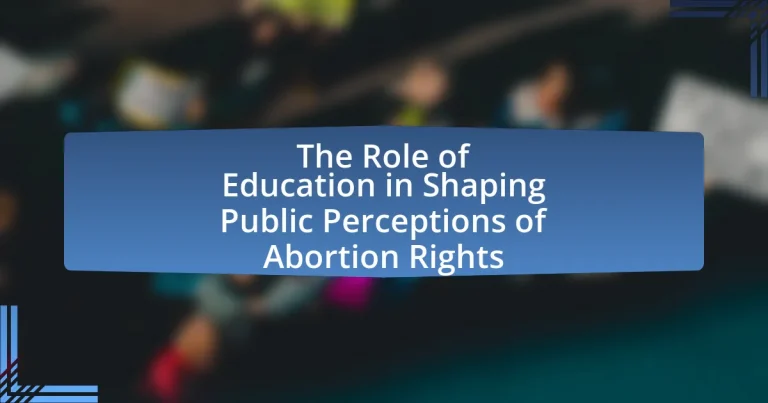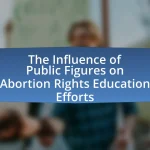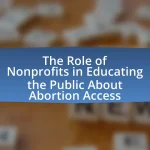The article examines the significant role of education in shaping public perceptions of abortion rights. It highlights how higher levels of education correlate with more progressive views on abortion, emphasizing the importance of comprehensive sex education and critical thinking in fostering informed discussions. The article also explores the impact of educational institutions, community outreach, and media on public understanding of abortion issues, while addressing challenges such as misinformation and societal stigma. Ultimately, it underscores the potential for education to influence future legislation and societal attitudes towards reproductive rights.
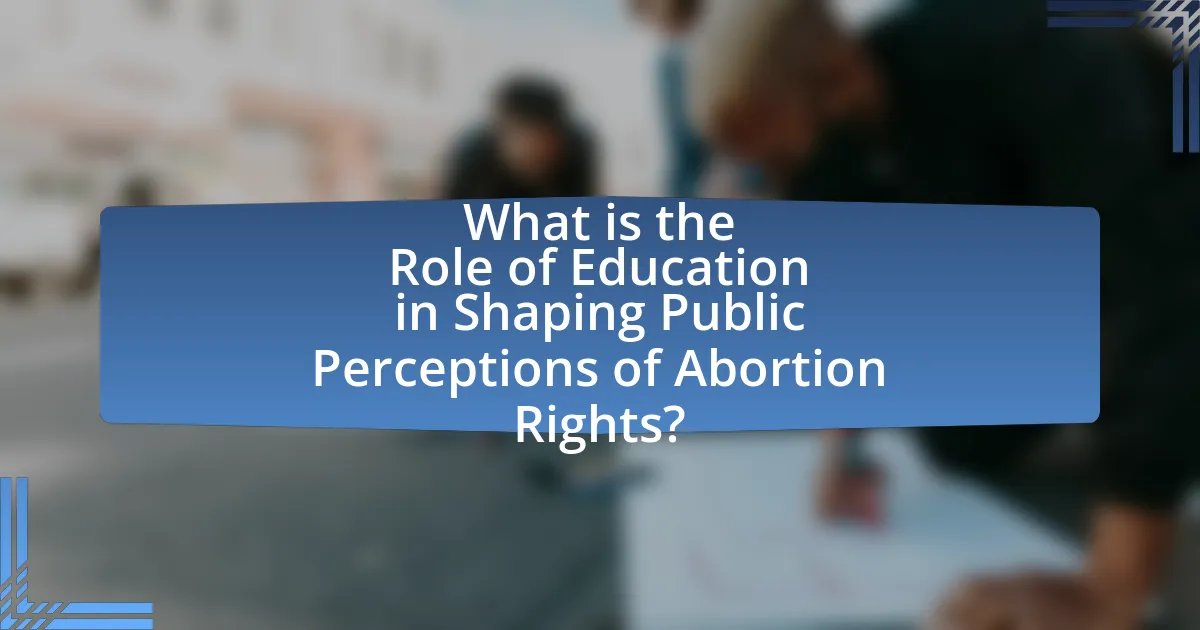
What is the Role of Education in Shaping Public Perceptions of Abortion Rights?
Education plays a crucial role in shaping public perceptions of abortion rights by providing individuals with knowledge about reproductive health, legal frameworks, and ethical considerations. Research indicates that higher levels of education correlate with more progressive views on abortion, as educated individuals are often better equipped to understand the complexities surrounding the issue. For instance, a study published in the Journal of Health and Social Behavior found that individuals with college degrees are more likely to support abortion rights compared to those with only a high school education. This trend suggests that education fosters critical thinking and informed discussions, which can lead to more supportive attitudes toward reproductive rights.
How does education influence individual beliefs about abortion rights?
Education significantly influences individual beliefs about abortion rights by providing critical information and fostering critical thinking skills. Higher levels of education are associated with more progressive views on abortion, as educated individuals tend to have greater access to comprehensive sex education, knowledge of reproductive health, and awareness of women’s rights. Research indicates that individuals with a college degree are more likely to support abortion rights compared to those with only a high school education, as evidenced by a 2019 Pew Research Center study showing that 70% of college-educated individuals favor legal abortion in all or most cases, compared to 50% of those without a college degree. This correlation suggests that education shapes attitudes by enhancing understanding of the complexities surrounding abortion and promoting empathy towards women’s autonomy.
What educational factors contribute to differing views on abortion?
Educational factors that contribute to differing views on abortion include the level of formal education, exposure to comprehensive sex education, and the influence of religious education. Individuals with higher levels of formal education often demonstrate more liberal views on abortion, as studies indicate that education correlates with increased awareness of reproductive rights and access to information. Comprehensive sex education programs, which provide factual information about reproductive health, have been shown to reduce stigma and promote understanding, leading to more supportive attitudes toward abortion. Additionally, religious education can shape beliefs about morality and ethics surrounding abortion, often resulting in more conservative views among those with strong religious affiliations. These educational influences collectively shape public perceptions and attitudes toward abortion rights.
How do educational institutions address the topic of abortion rights?
Educational institutions address the topic of abortion rights through curriculum development, policy implementation, and student engagement initiatives. Many universities incorporate discussions on reproductive rights into courses related to health, ethics, and law, fostering critical thinking and awareness among students. Additionally, institutions often establish policies that support access to reproductive health services, including counseling and medical care, which reflects a commitment to student well-being. For example, a 2021 survey by the American College Health Association indicated that 60% of colleges provide resources related to reproductive health, including information on abortion services. This approach not only educates students but also shapes public perceptions by normalizing discussions around abortion rights within academic settings.
Why is understanding public perception of abortion rights important?
Understanding public perception of abortion rights is crucial because it influences policy decisions, social movements, and healthcare access. Public opinion shapes legislative agendas; for instance, surveys indicate that approximately 60% of Americans support legal abortion in most cases, which impacts lawmakers’ stances and actions. Additionally, understanding these perceptions helps organizations tailor educational campaigns to address misconceptions and foster informed discussions, ultimately affecting the societal landscape surrounding reproductive rights.
What impact does public perception have on abortion legislation?
Public perception significantly influences abortion legislation by shaping policymakers’ decisions and public discourse. When a majority of the population supports or opposes abortion rights, legislators often respond to these sentiments to align with their constituents’ views, as seen in various states where public opinion polls directly correlate with legislative actions. For instance, a 2021 Gallup poll indicated that 58% of Americans identified as pro-choice, which has led to the introduction and support of more progressive abortion laws in several states. Conversely, in regions where anti-abortion sentiment prevails, such as in many Southern and Midwestern states, restrictive laws have been enacted, reflecting the prevailing public attitudes. Thus, public perception acts as a critical driver in the formulation and modification of abortion legislation.
How do societal attitudes towards abortion evolve with education?
Societal attitudes towards abortion generally become more supportive as education levels increase. Research indicates that individuals with higher education are more likely to understand the complexities surrounding reproductive rights, leading to more progressive views on abortion. For instance, a study published in the journal “Public Opinion Quarterly” found that college-educated individuals are significantly more likely to support abortion rights compared to those with only a high school education. This trend is attributed to increased access to information, critical thinking skills, and exposure to diverse perspectives that education provides, which collectively foster a more nuanced understanding of the issue.
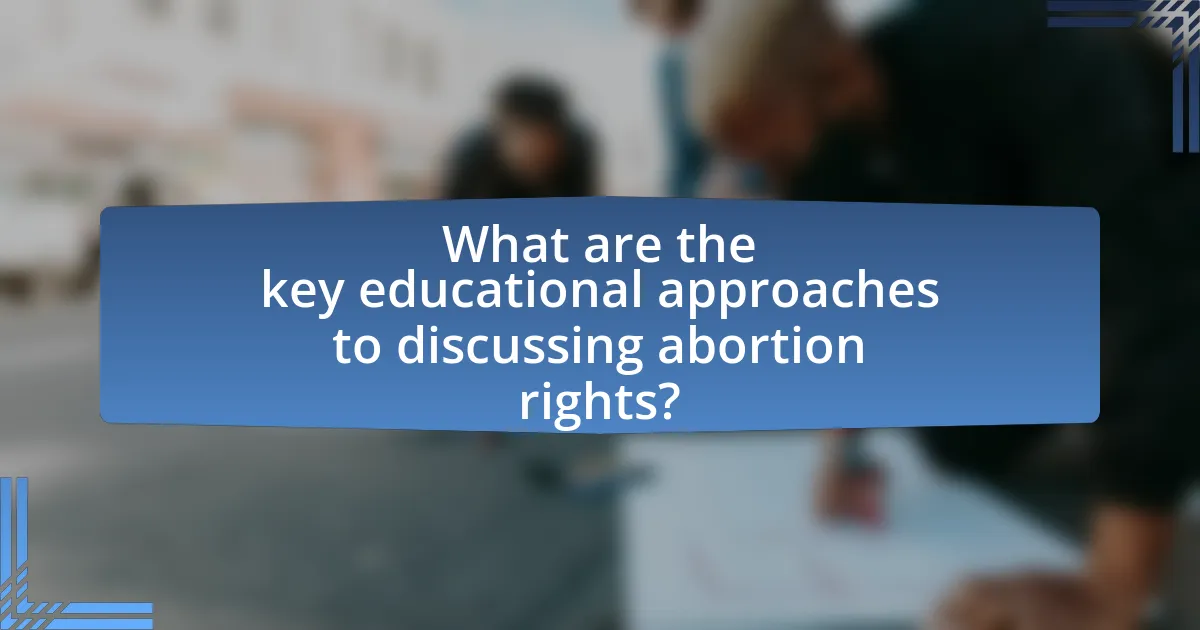
What are the key educational approaches to discussing abortion rights?
Key educational approaches to discussing abortion rights include comprehensive sex education, critical thinking development, and inclusive dialogue. Comprehensive sex education provides factual information about reproductive health, empowering individuals to make informed decisions. Critical thinking development encourages students to analyze various perspectives on abortion, fostering a deeper understanding of ethical, legal, and social implications. Inclusive dialogue promotes respectful conversations among diverse viewpoints, which can help reduce stigma and misinformation surrounding abortion. These approaches are supported by research indicating that education can significantly influence public perceptions and attitudes toward abortion rights, ultimately leading to more informed and empathetic discussions.
How do different educational curricula address abortion rights?
Different educational curricula address abortion rights through varying perspectives, often influenced by cultural, political, and religious contexts. For instance, comprehensive sex education programs typically include discussions on reproductive rights, emphasizing informed decision-making and access to safe abortion services. In contrast, some curricula, particularly in conservative regions, may present abortion as morally objectionable, focusing instead on abstinence and alternatives to abortion. Research indicates that states with comprehensive sex education report lower rates of unintended pregnancies and abortions, highlighting the impact of educational approaches on public perceptions and outcomes related to abortion rights.
What role do sex education programs play in shaping perceptions?
Sex education programs play a crucial role in shaping perceptions by providing accurate information about sexual health, relationships, and consent. These programs help to reduce stigma and misinformation surrounding sexual topics, leading to more informed attitudes and behaviors among participants. Research indicates that comprehensive sex education is associated with lower rates of unintended pregnancies and sexually transmitted infections, as well as increased understanding of consent and healthy relationships. For instance, a study published in the Journal of Adolescent Health found that students who received comprehensive sex education were more likely to report positive attitudes towards sexual health and relationships compared to those who did not receive such education.
How do higher education institutions contribute to the discourse on abortion rights?
Higher education institutions contribute to the discourse on abortion rights by fostering critical thinking, providing research opportunities, and facilitating open dialogue among students and faculty. These institutions often host debates, lectures, and workshops that encourage diverse perspectives on abortion, thereby shaping public perceptions. For instance, universities may conduct studies that analyze the impact of abortion laws on women’s health, contributing empirical data to the conversation. Additionally, academic programs in gender studies, public health, and law often include abortion rights as a key topic, equipping students with the knowledge to engage in informed discussions. This educational framework not only enhances understanding but also empowers students to advocate for reproductive rights in broader societal contexts.
What methods are effective in educating the public about abortion rights?
Effective methods for educating the public about abortion rights include comprehensive sex education, community outreach programs, and the use of digital media campaigns. Comprehensive sex education provides factual information about reproductive health, including abortion, which can reduce misinformation. Community outreach programs, such as workshops and seminars, engage local populations and foster discussions that clarify misconceptions. Digital media campaigns leverage social media platforms to disseminate accurate information quickly and widely, reaching diverse audiences. Research indicates that states with comprehensive sex education have lower rates of unintended pregnancies, highlighting the effectiveness of informed education in shaping public perceptions.
How can community outreach programs enhance understanding of abortion issues?
Community outreach programs can enhance understanding of abortion issues by providing accurate information, fostering open dialogue, and addressing misconceptions. These programs often include workshops, seminars, and informational campaigns that educate participants about the medical, legal, and ethical aspects of abortion. For instance, a study by the Guttmacher Institute found that comprehensive sex education and access to reproductive health information significantly improve public knowledge about abortion and related issues. By engaging diverse community members, these outreach initiatives create a platform for discussion, allowing individuals to share personal experiences and perspectives, which can lead to greater empathy and informed opinions.
What role do media and technology play in education about abortion rights?
Media and technology play a crucial role in educating the public about abortion rights by disseminating information, shaping narratives, and facilitating discussions. Various platforms, such as social media, news outlets, and educational websites, provide access to diverse perspectives and factual data regarding abortion laws, health implications, and personal stories. For instance, a study by the Guttmacher Institute found that comprehensive sex education, which often includes discussions about abortion, leads to more informed attitudes among young people. Additionally, technology enables real-time updates on legislative changes and mobilizes advocacy efforts, enhancing public engagement and awareness.
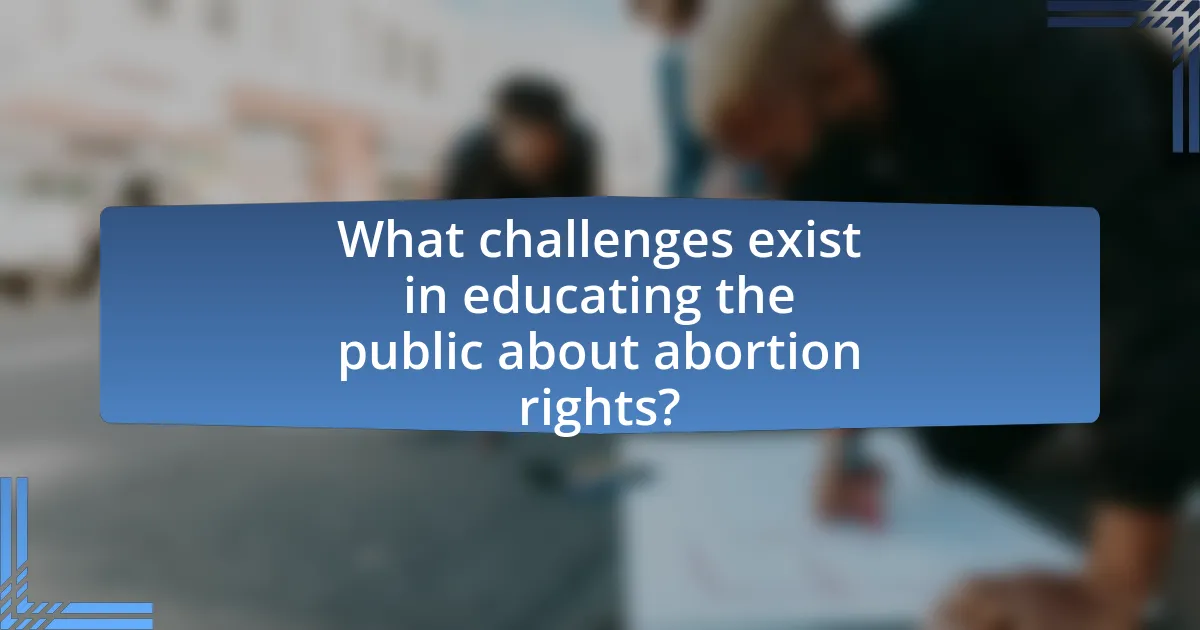
What challenges exist in educating the public about abortion rights?
Educating the public about abortion rights faces significant challenges, primarily due to misinformation and polarized opinions. Misinformation often spreads through social media and political rhetoric, leading to misconceptions about the legal status and medical aspects of abortion. For instance, a 2021 study by the Guttmacher Institute found that 75% of Americans were unaware of the legal protections surrounding abortion in their states, highlighting the gap in accurate information. Additionally, societal stigma and cultural beliefs can hinder open discussions, making it difficult for educational initiatives to reach diverse audiences effectively. These factors contribute to a fragmented understanding of abortion rights, complicating efforts to foster informed public discourse.
How do cultural and religious beliefs impact education on abortion rights?
Cultural and religious beliefs significantly influence education on abortion rights by shaping the values and perspectives that are taught in educational settings. For instance, in communities where conservative religious views dominate, educational curricula may emphasize abstinence and discourage discussions about abortion, framing it as morally unacceptable. This can lead to a lack of comprehensive sex education and limited access to information about reproductive rights. Conversely, in more liberal or secular environments, education may promote a broader understanding of reproductive health, including abortion rights, emphasizing individual choice and bodily autonomy. Research indicates that states with more progressive educational policies tend to have higher rates of awareness and acceptance of abortion rights, demonstrating the direct correlation between educational content and public perception.
What barriers do educators face when discussing abortion in classrooms?
Educators face several barriers when discussing abortion in classrooms, primarily including societal stigma, lack of training, and legal restrictions. Societal stigma surrounding abortion often leads to discomfort among educators and students, making open dialogue challenging. Additionally, many educators report feeling unprepared to address the topic due to insufficient training on reproductive health education, which can hinder effective teaching. Legal restrictions in various regions further complicate discussions, as educators may fear repercussions for discussing abortion in a manner that contradicts local laws or community norms. These barriers collectively impede comprehensive education on abortion rights and reproductive health.
How can misinformation about abortion rights be addressed in education?
Misinformation about abortion rights can be addressed in education through comprehensive curricula that include accurate, evidence-based information about reproductive health. Educational institutions should incorporate lessons that cover the legal, medical, and ethical aspects of abortion, ensuring that students understand the historical context and current laws surrounding abortion rights. Research indicates that comprehensive sex education, which includes discussions about abortion, leads to better-informed students and reduces stigma (Advocates for Youth, 2020). By training educators to effectively communicate these topics and providing resources that counteract common myths, schools can foster a more informed public discourse on abortion rights.
What strategies can improve education on abortion rights?
Comprehensive strategies to improve education on abortion rights include integrating accurate, evidence-based information into school curricula, promoting open discussions in community forums, and utilizing digital platforms for outreach. Research indicates that comprehensive sex education, which includes information on reproductive rights, leads to better understanding and acceptance of abortion issues among youth. For instance, a study published in the Journal of Adolescent Health found that students exposed to comprehensive sex education were more likely to have informed views on reproductive health, including abortion. Additionally, community engagement initiatives that involve healthcare professionals can provide firsthand knowledge and dispel myths surrounding abortion, further enhancing public understanding.
How can collaboration between educators and advocacy groups enhance public understanding?
Collaboration between educators and advocacy groups can enhance public understanding by combining educational expertise with advocacy efforts to disseminate accurate information about abortion rights. Educators can develop curricula that incorporate factual data and diverse perspectives, while advocacy groups can provide real-world context and mobilize community engagement. For instance, studies show that comprehensive sex education programs, which often involve collaboration with advocacy organizations, lead to increased awareness and understanding of reproductive rights among students. This partnership not only informs but also empowers individuals to engage in informed discussions and advocacy, thereby fostering a more knowledgeable public.
What best practices should be implemented in educational settings regarding abortion rights?
Educational settings should implement comprehensive sex education that includes information on abortion rights, emphasizing informed decision-making and reproductive health. This approach ensures that students understand their rights and the legal context surrounding abortion, fostering a supportive environment for discussions. Research indicates that comprehensive sex education leads to better health outcomes and reduces stigma associated with reproductive choices, as evidenced by studies from the Guttmacher Institute, which highlight the positive impact of informed education on adolescent health behaviors.
What are the implications of education on future public perceptions of abortion rights?
Education significantly influences future public perceptions of abortion rights by fostering critical thinking and informed decision-making. Research indicates that individuals with higher levels of education tend to support reproductive rights more than those with less education. For instance, a study published in the journal “Public Opinion Quarterly” found that college-educated individuals are more likely to advocate for abortion access, reflecting a correlation between educational attainment and progressive views on reproductive issues. This trend suggests that as educational access expands, public perceptions may increasingly favor abortion rights, leading to more supportive policies and societal norms.
How might changes in educational approaches affect future legislation on abortion?
Changes in educational approaches can significantly influence future legislation on abortion by shaping public perceptions and attitudes toward reproductive rights. For instance, comprehensive sex education that includes information about reproductive health and rights has been shown to lead to more informed and supportive views on abortion among students. Research indicates that states with more comprehensive sex education programs tend to have lower rates of unintended pregnancies and higher acceptance of abortion rights, as evidenced by studies from the Guttmacher Institute. This suggests that as educational curricula evolve to include more inclusive and factual information about abortion, public support for reproductive rights may increase, potentially leading to more progressive legislation.
What role will education play in shaping the next generation’s views on abortion rights?
Education will play a crucial role in shaping the next generation’s views on abortion rights by providing comprehensive information and fostering critical thinking. Through curricula that include discussions on reproductive health, ethics, and legal frameworks, students will develop informed perspectives. Research indicates that education significantly influences attitudes; for instance, a study published in the Journal of Adolescent Health found that comprehensive sex education correlates with more progressive views on reproductive rights among young adults. Thus, educational initiatives can empower individuals to understand the complexities surrounding abortion rights, ultimately shaping societal norms and values.
